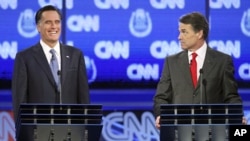The U.S. presidential election process formally begins January 3rd in the Midwest state of Iowa when Republicans will cast the first votes to choose a party nominee to run against President Barack Obama in November of 2012. The domestic economy and jobs have dominated the Republican candidate debates, but foreign policy issues occasionally come up, including the subject of U.S. foreign aid.
At the most recent Republican debate in Las Vegas, several of the candidates made it clear they would cut foreign aid if elected president.
Texas Governor Rick Perry said, “I think it is time for this country to have a very real debate about foreign aid.”
Another contender, Texas Congressman Ron Paul, argued the United States has no business sending aid abroad.
“It is not authorized in the Constitution that we can take money from you and give it to particular countries around the world. To me, foreign aid is taking money from poor people in this country and giving it to rich people in poor countries,” said Paul.
Former Massachusetts Governor Mitt Romney, who remains the top choice for many Republicans, said tough economic times at home would mean aid cutbacks overseas.
“I happen to think it does not make a lot of sense for us to borrow money from the Chinese to go give to another country for humanitarian aid. We ought to let the Chinese take care of those people,” Romney said.
The Republican comments on cutting foreign aid prompted criticism from evangelical Christian leaders, including Richard Cizik.
“All of these kinds of programs actually are in our national interest and from an evangelical Christian point of view they are also important because they reflect our biblical values, caring about other people,” Cizik said.
Cizik and others note the importance of U.S. aid programs such as flood relief in Pakistan, earthquake disaster assistance in Haiti and fighting poverty and disease in Honduras.
Foreign policy experts say there is domestic support for U.S. aid efforts abroad. Heather Hurlburt is with the National Security Network.
“When you do public-opinion polling of American citizens they are extraordinarily committed to the idea that we live in a global society and that we are intimately connected to people around the world and it is our responsibility as citizens to step in and support people elsewhere,” Hurlburt said.
Hurlburt adds that most Americans do not realize that foreign aid accounts for such a small percentage of the federal budget.
“U.S. foreign aid is less than one-percent of U.S. annual spending," said Hurburt. Americans, when they are polled, tend to say that they think it is about 20 percent and they think it should be, by the way, between five and ten percent, which would be of course a five-fold increase in how we actually support the rest of the world.”
The issue is likely to come up again during a November 15th Republican debate that will deal only with foreign policy issues.

